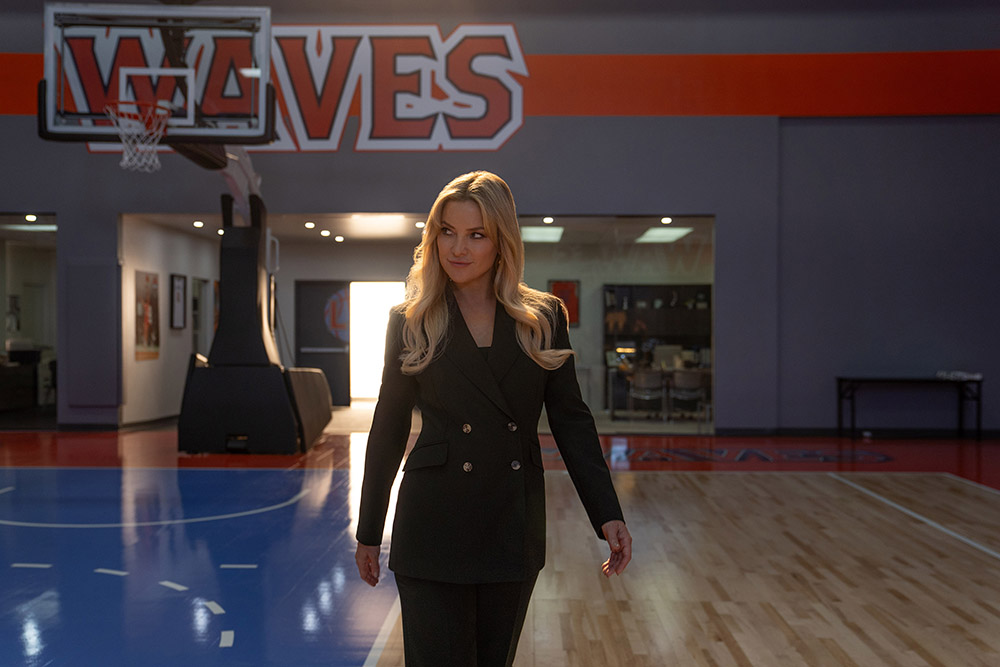Netflix - Running Point: A Courtside Comedy That Scores Laughs But Misses a Slam Dunk
By Mulder, 27 february 2025

From the moment Running Point kicks off, it’s clear that the show is not just about basketball. It’s about family dysfunction, gender politics, and the eternal struggle of proving oneself in a world that loves to underestimate outsiders. The series, co-created by Mindy Kaling, Ike Barinholtz, and David Stassen, follows Isla Gordon (Kate Hudson) as she is thrust into the leadership role of the fictional Los Angeles Waves, a position that few—perhaps even Isla herself—believe she can handle. But, much like the scrappy underdog in any good sports film, Isla is here to prove them all wrong. Or at least, stumble through the job with enough charm to keep us watching.
It’s impossible to discuss Running Point without drawing comparisons to Ted Lasso and Succession. The former, for its sports-adjacent optimism and feel-good tone; the latter, for its cutthroat family dynamics and nepotism-driven chaos. But while Running Point borrows from these influences, it never quite reaches the emotional depth of Ted Lasso or the razor-sharp wit of Succession. Instead, it finds itself somewhere in between—lighter, messier, but still undeniably entertaining.

At the heart of the show is Kate Hudson, who proves once again why she’s such a magnetic screen presence. Isla is the perfect role for her—a woman who has spent her life being dismissed, both professionally and personally, but who refuses to back down from a challenge. She’s charming, exasperated, and just self-destructive enough to keep things interesting. Hudson plays her with the right mix of confidence and vulnerability, making it easy to root for her even when she’s making questionable decisions (which happens a lot).
The rest of the Gordon family is a delightful disaster. Cam (Justin Theroux) is the eldest brother and former team president whose downfall—thanks to a not-so-casual crack habit—opens the door for Isla’s unexpected promotion. Ness (Scott MacArthur) is the goofy ex-player turned general manager who has a heart of gold but the decision-making skills of a toddler. And then there’s Sandy (Drew Tarver), the CFO, whose defining characteristics are his biting sarcasm, relentless skepticism, and deep-seated resentment that he wasn’t given the top job.

If you’ve ever been part of a family business, you’ll recognize the chaos. Meetings devolve into sibling squabbles. Professional disagreements turn into deeply personal arguments. And through it all, Isla has to prove, over and over again, that she’s more than just a token female figurehead. The show doesn’t shy away from the rampant sexism in the sports world—Isla is constantly dismissed, patronized, and underestimated—but it also doesn’t delve particularly deep into these themes. Instead, Running Point treats the workplace sexism Isla faces as an ongoing joke, rather than a serious narrative throughline. It’s a choice that sometimes works for comedy but occasionally feels like a missed opportunity for something more substantial.
The supporting cast adds plenty of color. Brenda Song is a scene-stealer as Isla’s fiercely loyal chief of staff, Ali. Fabrizio Guido’s Jackie, a stadium worker-turned-assistant, provides a fresh perspective on the Gordon family’s ridiculous privilege, even if his storyline sometimes feels a little tacked on. Max Greenfield is sweet but forgettable as Isla’s fiancé, Lev, a character who is so underdeveloped that his eventual arc feels more obligatory than impactful. And then there’s Jay Ellis as the Waves’ head coach, who is, let’s be honest, probably the real love interest in waiting. The chemistry between Ellis and Hudson is subtle but undeniable, and if the show leans into that dynamic in future seasons, it could add an intriguing layer to Isla’s personal life.

Of course, no sports show would be complete without the players themselves, and Running Point delivers a solid roster of basketball personalities. Chet Hanks (yes, that Chet Hanks) plays Travis Bugg, a hotheaded, self-destructive star player who can’t seem to stay out of trouble. Toby Sandeman and Uche Agada round out the team, providing enough locker-room drama to keep things interesting. However, much like Isla’s leadership arc, the show is more concerned with the off-court antics than the actual game. Basketball serves as the backdrop rather than the driving force of the story, which works in its favor—it’s not really about whether the Waves win or lose but about whether Isla can prove that she belongs.
Structurally, the show follows a familiar sitcom rhythm: each episode presents Isla with a new crisis—losing a major sponsor, navigating trade rumors, dealing with player scandals—which she fumbles through before ultimately finding a solution. The conflicts are never too dire, and the resolutions are often wrapped up neatly before the credits roll. It’s comfort TV, designed to be binge-watched in one or two sittings, and while it’s enjoyable, it sometimes feels like it could have done more with its premise. The stakes rarely feel high, and the humor—while consistently amusing—never quite reaches the laugh-out-loud heights of Kaling’s best work.

That being said, there’s something undeniably fun about Running Point. It’s a show that doesn’t take itself too seriously, and that’s part of its charm. The dialogue is fast and clever, the cast is having a blast, and the premise—though familiar—is executed well enough to keep you engaged. It’s not going to redefine the sports comedy genre, but it doesn’t need to. It knows exactly what it is: a breezy, easy-to-watch sitcom with just enough heart to make you care.
So, is Running Point a slam dunk? Not quite. But it’s definitely a solid three-pointer—entertaining, lighthearted, and just compelling enough to keep you coming back for more. And in an era where so many shows try to be the next big thing, there’s something refreshing about a series that’s content to simply be fun. Whether or not it has the legs for multiple seasons remains to be seen, but for now, Running Point is a worthy addition to Netflix’s lineup and a great showcase for Hudson’s comedic chops. If nothing else, it’s proof that Kate Hudson walking into glass doors will never not be funny.
Synopsis :
The hectic daily life of Isla Gordon, owner of the Los Angeles Lakers NBA team, who juggles her life as a wife and mother while managing a sports group representing a lot of money.
Running Point
Created by Elaine Ko, Mindy Kaling, Ike Barinholtz, David Stassen
Showrunners : Mindy Kaling, Ike Barinholtz, David Stassen
Starring Kate Hudson, Drew Tarver, Scott MacArthur
Executive producers : Mindy Kaling, Ike Barinholtz, David Stassen, Jeanie Buss, Linda Rambis, Howard Klein, Kate Hudson
Producer : Jordan Rambis
Production companies : Kaling International, 23/34 Productions, 3 Arts Entertainment, The Fusion Media, Warner Bros. Television Studios
Network : Netflix
Score : 3.5/5
Photos : Copyright Katrina Marcinowski / Netflix

